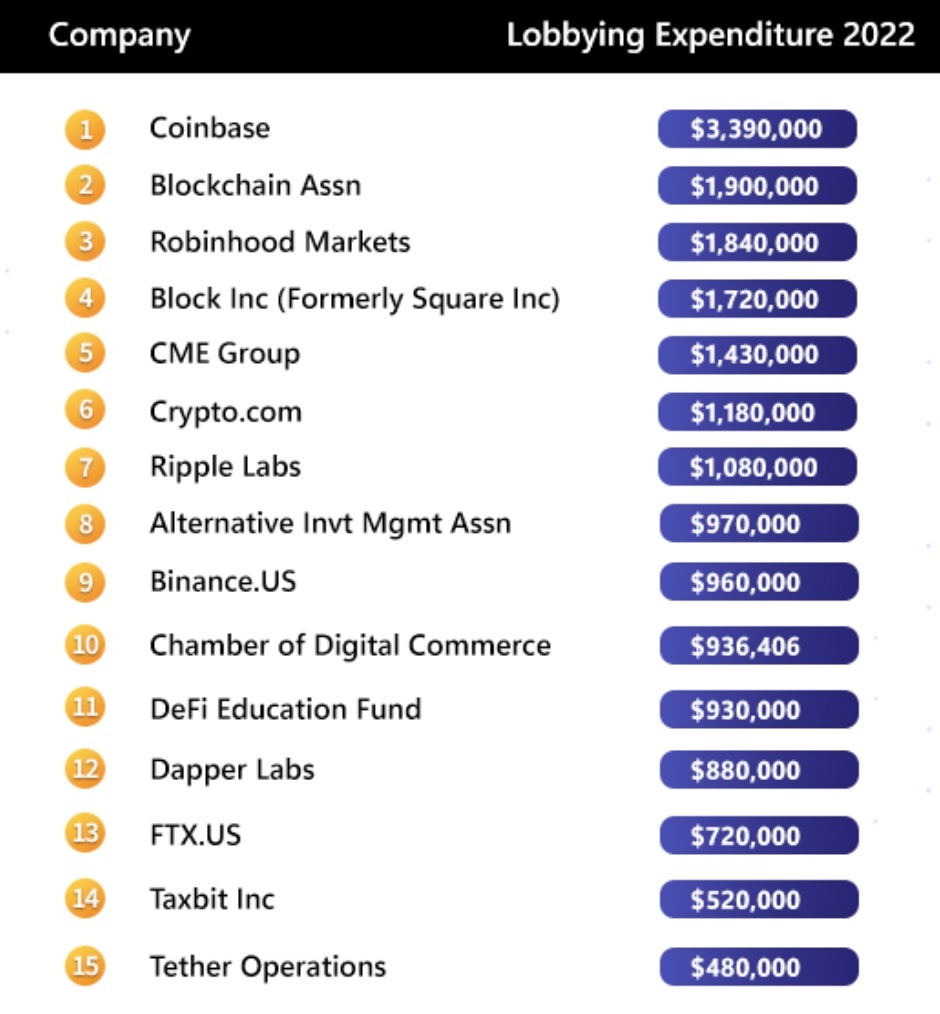Will Crypto Lobbying Spend Continue Big Growth In ‘Crucial’ Year?
Some set to continue lobbying push in hopes of spurring a breakout year for crypto regulation, while others could pull back

lazyllama/Shutterstock modified by Blockworks
Though US crypto companies pumped significant money into lobbying last year, there may be a consensus among industry participants that lawmakers and regulators have not done enough to create a comprehensive digital assets framework.
Some have been discouraged by a lack of regulatory clarity, while others are likely to keep bolstering their presence in Washington, DC, during a critical period for the sector.
One of crypto’s top lobbyist groups said it remains undeterred.
The Blockchain Association spent $1.9 million on lobbying last year — up from $900,000 in 2021, according to a recent report by the Money Mongers, which used data from OpenSecrets.
A Blockchain Association spokesperson said the organization intends to further increase its lobbying spending in 2023 but declined to comment further. The spokesperson confirmed the $1.9 million 2022 expenditure.
“Policymaker education is critically important for the industry,” Blockchain Association CEO Kristen Smith said in an email. “Explaining the current and future benefits of crypto networks, the promise and power of this technology, and the impact to our nation’s economy and jobs has never been more important.”
A standout year
Overall, crypto industry players shelled out roughly $25.6 million on lobbying last year, a year-over-year increase of 121%. Last year’s total is roughly equal to the amount spent over the five years prior combined, according to the Money Mongers report.

The only company to outspend Blockchain Association was Coinbase, which allocated nearly $3.4 million into crypto lobbying efforts last year. The crypto exchange had spent about $1.5 million on such efforts the year prior.
Coinbase used 32 lobbyists in 2022, OpenSecrets data shows — slightly more than its 28 the year before and more than quadruple the seven it used in 2020.
A spokesperson for the crypto exchange declined to comment.
But Coinbase is unlikely to shrink its presence in Washington, DC, after receiving a Wells notice from the SEC, a person familiar with the matter told Blockworks.
The SEC shared concerns last month about alleged securities violations, according to the notice — a letter that typically precedes an agency enforcement action.
Other crypto companies in the top 10 for lobbying spend in 2022 include Ripple Labs and Binance.US, which spent nearly $1.1 million and $960,000, respectively.

Representatives for both firms did not immediately return requests for comment.
Lobbyist spending could plateau
The report comes as crypto companies have hired lobbyists in recent months, filings show.
A spokesperson for Binance previously told Blockworks that the arrest of FTX founder Sam Bankman-Fried in December spurred the exchange’s global business to bolster its presence in DC.
Though some lawmakers have said crypto legislation is a near-term focus, concrete industry-specific rules still don’t exist.
Some companies, therefore, could choose to pull back.
Gabriella Kusz, CEO of the Global Digital Asset and Cryptocurrency Association, told Blockworks in an email that she expects lobbying spending to plateau in 2023.
“On one side, there will be a reduction by some companies in US lobbying as they have already largely repositioned overseas and no longer see influencing US policy as core to their business,” Kusz said. “On the flipside, you’re going to see some companies who will recognize the importance of passing legislation this year as crucial — as this year represents a window of opportunity ahead of the 2024 election cycle.”
In terms of companies giving up on US regulators, Bittrex said last week it would shut down its US arm. The company’s CEO, Richie Lai, cited “regulatory uncertainty” — as well as US lawmakers and regulators “seemingly committed to extinguishing the industry” — as reasons for the decision.
The crypto exchange’s move to focus on its business overseas came as the SEC and CFTC have launched actions against companies in recent months in an apparent effort to continue regulating by enforcement.
Get the news in your inbox. Explore Blockworks newsletters:
- The Breakdown: Decoding crypto and the markets. Daily.
- 0xResearch: Alpha in your inbox. Think like an analyst.
- Empire: Crypto news and analysis to start your day.
- Forward Guidance: The intersection of crypto, macro and policy.
- The Drop: Apps, games, memes and more.
- Lightspeed: All things Solana.
- Supply Shock: Bitcoin, bitcoin, bitcoin.





